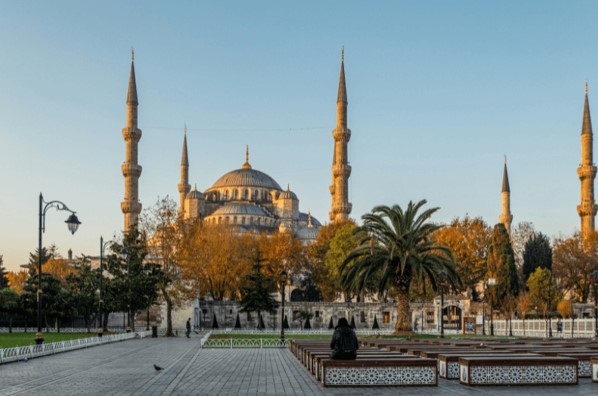
It’s the night before the wedding and the bride-to-be is living it up, sans men, on her last day as a single girl. All around me, girls are dancing, having their hands painted with henna, the bride’s mum is ululating the zaghroota, that joyful trilling characteristic of Arabian women.
The fashion is backless and strapless, short or plunging – sometimes simultaneously. The irony is that I’m the most modestly dressed, even though I’m the only woman in the room who didn’t arrive at this middle-class Cairo home wearing a hijab tied over her hair, cloaked in an abeya or hidden beneath a face-covering niqab.
When talking about travel in Islamic countries, top of the list of reasons why people refuse to visit is the treatment of women: the lack of access to education and financial independence, enforced dress mandates or the “guardianship” laws and customs that in extreme cases reduce women to the legal standing of a child.
There’s also the fear of being ignored, duped or even groped as you explore some of the world’s most lavish ancient civilisations and rich modern cultures.
There is much debate about their experiences yet how much do we talk about the problems of travelling as a woman in other parts of the world? Of the incessant catcalls of Italy? Of the hands-on approach in Japan’s crowded peak-hour trains? The “Eve teasing” of India or the boozy, unwanted groping in a gazillion bars across other parts of the world?
Many write off visiting Saudi Arabia on account of its human rights record, brought again to the world stage in brutal fashion in 2018 with the targeted murder of Washington Post columnist and Saudi dissident Jamal Khashoggi. But what of the women living and working in the most powerful country in the region?
Being a woman traveller allows access into the most integral part of Islamic society – family life. As a solo woman traveller, with considerable Middle East travel behind and hopefully ahead of me, I’ve been invited to rowdy girls-only nights and street weddings. I’ve been entrusted with the secret ingredient of a banquet of dishes in Palestinian home kitchens.
I’ve talked fashion and eyebrows behind the closed doors of Cairo’s hairdressing salons, of social status in Saudi Arabia, finance and law in the changing rooms of Abu Dhabi and, in the luxurious day spas of Oman, have been asked why women in Western countries change their names on marriage. The curiosity is mutual.
THE FEMALE-ONLY FACTOR

Solo travel isn’t for everyone. Photo: iStock
In an uncertain world, solo travel isn’t every woman’s cup of sweet mint tea, as demonstrated by the rise in popularity of women-only tours.
Before COVID-19, women-only travel was the fastest growing sector for leading small-group adventure company Intrepid Travel. Its launched female-led tours in some of the world’s most conservative countries, including Pakistan and Iran.
As international travel returns, so too are these tours. But why are women-only tour groups actually necessary? “Why aren’t they?” asks Hayley Morris, a former travel agent who founded Melbourne-based Sisterhood Womens Travel back in 2005, at the time getting a government exemption to operate as a single-sex tour operator. “When you get a call to book a group of guys for a getaway, you automatically think it’s a footy trip. But when a group of women wants to book a tour, everyone asks why.”
From her travel agency on the main street of little Numurkah, near Shepparton in northern Victoria, Hayley started fielding inquiries from women wanting to travel far from their farms. “If you know farmers, you’ll know they never like to leave their land, and these women wanted to see the world but weren’t confident enough to go by themselves.”
With an older demographic, many of her travellers, some of whom are widowed, are, for the first time in their lives, financially independent. This year sees her tours return to Egypt and Jordan after a COVID-induced hiatus.
“The majority of our travellers love to visit such places with the emotional, encouraging support that a women-only tour gives them,” says Hayley. “But over the years, I’ve found that it’s so much more than just the destination.”
Sarah Hoyland, co-owner of the Classic Safari Company, agrees. “The biggest challenge women travellers face is the mental challenge of overcoming the million reasons why they shouldn’t go,” she says. “As a mother, wife, business owner, sister, friend… there is always a reason why I feel shouldn’t put myself first.”
She’s been planning women-only travel since 2017 after being asked to arrange a getaway for her girlfriends. “They were thinking of the Gold Coast but I booked us to India. And it was epic.”
Morocco remains the firm favourite for her group. “We make our own perfume. We do spas. We go shopping, and we also dress up,” says Sarah. “We shop for traditional clothing and ride out into the Sahara on our camels at sunset, wearing our new turbans. Do most men want to do that?”
GOING THERE AND GIVING BACK

Cooking in Iran with Intrepid Travel. Photo: Damien Raggatt
While women-only tours provide safety and context for Australian women travellers, the corollary is the benefit to women in the countries that they’re visiting. Before the pandemic, tourism generated more than 10 per cent of global GDP and created about 300 million jobs, including paid employment for women coming face-to-face with travellers, as tour guides and travel agents, as chefs or hoteliers.
“Relaunching Women’s Expeditions enables us to continue our support for some truly inspirational women who rely on tourism to support themselves, their families and their communities,” says Erica Kritikides, general manager global product at the Melbourne-based Intrepid Travel, “many of whom suffered greatly because of the COVID-19 pandemic.”
Even in the most marginalised societies, tourism has created social enterprises that benefit both the traveller and her host.
Take, for instance, the Treadright Foundation, a not-for-profit arm of tourism behemoth The Travel Corporation (TTC), whose brands include Trafalgar, Contiki, AAT Kings and Adventure World. It champions the Iraq Al-Amir Women’s Co-operative, a woman-run initiative in Jordan that runs cooking classes and sells traditional crafts, aiming to help local women become financially independent.
“We hike bush trails, meander markets or swim in the ocean,” says Hoyland. “We shop till we drop, but above all we learn from the women we meet. They teach us about their communities, what we have in common, and what’s important in life – family, friends and the future.”
Travelling recently in Saudi Arabia, the women I spoke to – in the cafes and the street markets, in airport security and my guides – range widely in age, wealth, education and circumstance.
Yet they are all watching the great upheaval currently under way in Saudi society and law, which sees independent women like me able to travel freely in their country. More importantly, it is their own lives that are changing, from the well-publicised new right to drive, the ability to hold their own passport and to forge a greater determination over their own lives.
“Particularly the Middle East can be a very oppressed region for women,” says Morris. “So, I think that the more women travel there, supporting women-run ventures and co-ops, we can bring some equality, a sense of pride and positive change for women, while respecting their culture.”
DECIPHERING THE DRESS CODES

Photo: Alamy
Aside from the overarching issues of human rights, one of my biggest sources of pre-travel anguish is what to wear. As the saying goes, first impressions last, and being told what to wear is the first, and most obvious stumbling block in the argument for women’s rights.
Will I be too hot, too cold, too revealing, too covered up? Like many, many countries in the world, modest clothing is preferred, advised and sometimes even prescribed, especially when entering sacred spaces.
I’ve donned the Iranian chador but once, when entering the Holy Shrine of Fatimah Masumeh in the Shi’a pilgrim city of Qom, in central Iran. The semi-circular cloaks, which are held closed by a hand clutched under your chin, are supplied out the front of the mosque.
I’ve draped an abaya (cloak) over my clothes and a shayla (scarf) over my hair when entering Abu Dhabi’s dramatic Sheikh Zayed Grand Mosque and the extravagant Sultan Qaboos Grand Mosque in Oman, and my wardrobe has an unnatural number of scarves in a rainbow of colours, ready to whip out should the occasion – modesty, mosque or ice- cream spilt down a shirtfront – demand.
While black is a fashion statement in Australia, in much of the Middle East, it’s associated with respectability and religiosity. Sometimes, fashion and modesty collide, and maxi dresses become the perfect go-to for women travellers wanting to appear respectful and fashionable.
But fashion changes, and outlooks do, too. Now, as Saudi Arabia moves toward a more moderate version of Islam (as says its Crown Prince), the abaya requirement has been kicked to the sidelines, and covering your hair is left only to Iran, Afghanistan and the Indonesian province of Aceh to mandate.
Turkey has always been fashion-forward in the region, while hot pants are no great shakes in multicultural Dubai. The women-owned and operated Dubai day-tour company Emirati Kashtas advises dressing more modestly away from the resorts and hotels.
In Cairo, where women travellers have always been instructed to cover past their elbows and knees, it would have been unthinkable just a few years ago to wander Islamic Cairo in tight jeans and a t-shirt. Now, it’s the dress code. And the Instagram accounts of the city’s nightclubs are packed with photos of girls in midriff tops and sprayed-on trousers – no hijabs here.
SORRY, YOU’VE GOT MALE

In Morocco with the Classic Safari Company.
Travel in this region is certainly not all roses and spa treatments and tourism can’t fix all of its problems. Sarah Hoyland freely admits that her tours in Morocco always have a male guide. “When our female guides complain, nothing gets done. But get a man to complain about hotel rooms, and our guests are moved within minutes.”
But there are lesser-known privileges for women in this fascinating world: older women jump straight to the head of the queue with impunity – in the bank, the butcher’s, at the ticket office. No-one complains. And women-and-children-only carriages are found on trains, buses, airport shuttles and even in cosmopolitan Dubai’s metro and they are invariably less crowded.
On my solo adventures, I catch taxis late into the night in Saudi – no fighting with drunks on the street for a cab at closing time in these (publicly) teetotaller countries. I am invariably treated with courtesy, as well as genuine curiosity, by the male drivers, and many countries, including Egypt and the United Arab Emirates (UAE)), now also have “pink” taxis, driven by women for women passengers.
Love or hate the ridesharing revolution, it has been a godsend for women travellers: with Uber and its Dubai-born counterpart Careem (now owned by Uber) ubiquitous in the Middle East, solo female travellers can share their trackable journey in real time, with a fixed price, and give dodgy taxi drivers the flick.
FIVE WOMEN-ONLY TOURS TO THE MIDDLE EAST
MOROCCO
Classic Safari Company’s Sarah Hoyland is joined by Sydney-based designer Nadine Donazzan, on a luxury 18-day tour. Starting in Casablanca, it journeys to the imperial cities of Fez and Meknes, on to the Draa Valley and Marrakech and into the Sahara. Make your own perfume, hang out with an all-women collective of rug traders, and meet the women of the Imik Simik Women’s Association at Ait Ben Haddou, an 8th-century fortified village between the Sahara Desert and Marrakesh. Through pastry, couscous making and embroidery, this group has become financially independent, promoting education and skills among women and girls. Dates: September 21-October 5, 2022. From $11,970, phone (02) 9327 0666. See classicsafaricompany.com.au
IRAN
From the Iranian capital, Tehran, to Yazd, Shiraz, Esfahan and Kashan, this tour is run by local female tour guides and includes a visit to the ruined city of Persepolis and a village of Qashqai nomads. Highlights include a visit to a women-only park in Tehran, where women can take their hijabs off outdoors; dinner in a family home; a cooking class with a female chef, and a visit to a Tehrani women-run beauty salon – historically one of a few ways women can achieve financial independence, especially now that COVID has impacted severely on their participation in the workforce. Intrepid also runs women-only tours to Jordan, Morocco, India and Peru. Tours run throughout the year. From $3195, phone 1300 797 010. See intrepidtravel.com
TURKEY
A 10-day tour through Turkey with haggling in Istanbul’s Grand Bazaar, travelling south to Gallipoli and then on to the ruins of Troy and Ephesus. Visit Pamukkale’s thermal pools before heading eastward to Cappadocia to discover cave cities and whirling dervishes, all led by a female travel director. The rural village of Demircidere is regarded as Turkey’s “most progressive community”, electing its first female town leader in 1933. Here lunch is with local women who open up their homes to teach foreign guests how to bake traditional bread and try the local wine. Trafalgar also offers six-day women-only tours through Jordan. Dates: September 2-11, 2022. From $2488 (includes internal flights), phone 1800 002 007. See trafalgar.com
EGYPT AND JORDAN
A 22-day journey through the timeless attractions of ancient Egypt, including the Pyramids of Giza, Luxor, Aswan and Abu Simbel, guided by travel industry veteran Denise Moore of Sisterhood Womens Travel. Spend four nights cruising the Nile with a guided tour of the Golden Mummies Museum and a night sleeping beneath the stars in the White Desert of the Bahariya Oasis. Petra and Wadi Rum are the highlights of Jordan as well as the Crusader castle of Kerak. The tour includes a cooking class at the women-run Beit Sitti in Amman and a belly-dancing class in Cairo. Dates: November 3-22, 2022. From $13,899 (twin share, includes airfares ex-Melbourne), phone 1300 885 255. See sisterhoodwomenstravel.com.au
EGYPT
Escorted by Andrea Powis, the founder of the Travelling Divas tour company, this 12-day luxury tour links in with specialist guides, and includes stays in some of Egypt’s most luxurious hotels as well as four days’ cruising on the Sanctuary Nile Adventurer. Continue to Egypt’s deep south to visit the colossal architecture of Abu Simbel, and gain exclusive access to enter the Sphinx Valley to stand between the Paws of the Sphinx. Indulge in hot-air ballooning mornings, spa afternoons and evenings of light shows and get lost shopping the spice markets of Aswan. Dates: March 13-24, 2023. From $15,770 (twin share), phone 0408 721 569. See travellingdivas.com




More Stories
Complete Guide To Exuma’s Hidden Gem
Birkenstock Sandals Are on Major Sale
Complete Guide To Austria’s Beautiful Capital City